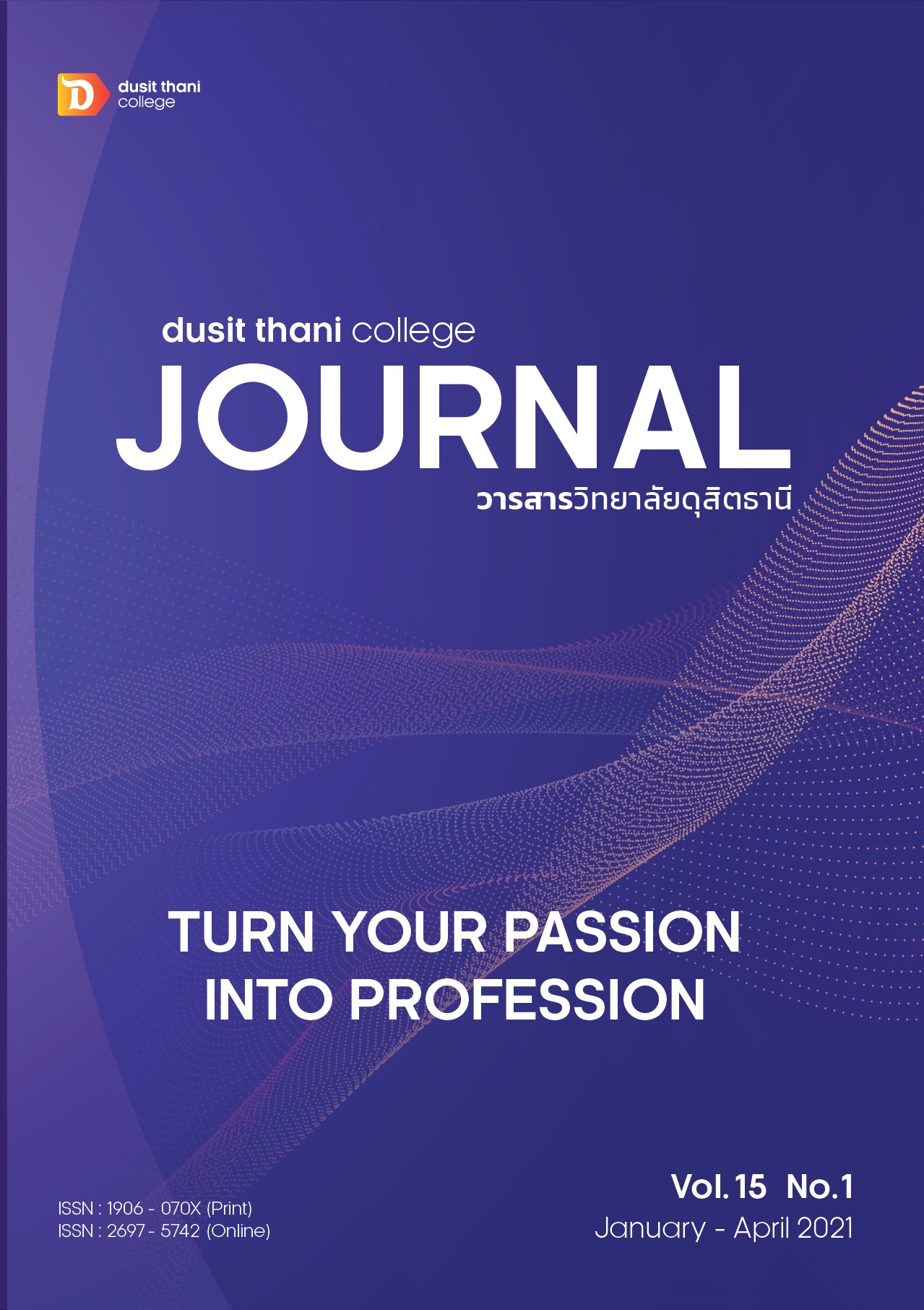THE POTENTIAL OF ECOTOURISM IN NOPPHITAM DISTRICT, NAKHON SI THAMMARAT PROVINCE
Main Article Content
Abstract
Research on the potential of ecotourism in Nopphitam District, Nakhon Si Thammarat Province aims to evaluation of the potential of ecotourism sites. The research design mix methods research. The population and samples were community members, officials from the park and enterprise accommodations 21 people. The samples were obtained by using a specific sampling method. The data collection process consisted of in-depth interview and focus group. Content was analyzed through content analysis to evaluating the assessment and separating the scores from quality standards for ecotourism destinations.
The study found that, The potential of ecotourism destinations in Nopphitam district Nakhon Si Thammarat Province an excellent standard (score 87.70). The most recommended value is Yod Khao Lheam viewpoint (score 93.27), Khao junglhorn (score 90.89), Krung Ching Waterfall (score 89.93), Klai Canal Rafting (score 89.47), Hong Cave (score 86.70) and Huai Lek Pra Forest Trail (score 75.86).
Suggestions for ecotourism development in Noppitam District, Nakhon Si Thammarat province of ecotourism service providers. 1. Facilities should be managed such as safety measures. 2. Should be involved in all activities of ecotourism on a continuous basis, such as having a discussion meeting at least once a month. 3. Marketing communication should be established. Including marketing channels by focusing on social media with minimum cost and able to reach a large number of target groups. As well as, assessing the readiness of the community, such as the number of personnel in the service travel activities and enough space to accommodate tourists. For government agencies and the private sector, Knowledge management processes should be continuously supported for ecotourism service providers and local communities. Encourage to link activities such as transport, travel, and making food souvenirs, etc.
Article Details
Article Screening Policy
- All research and academic articles to be published must be considered and screened by three peer reviews in the relevant field / article.
- All articles, texts, illustrations and tables published in the journal are the personal opinions of the authors. Editors don't always have to agree. And no responsibility whatsoever is the sole responsibility of the author.
- The articles to be published must never be published. Where did you first publish? And not in the consideration of other journals If the audit found that there has been a duplicate publication It is the sole responsibility of the author.
- Any article that the reader sees as being plagiarized or impersonated without reference. Or mislead the work of the author Please let the journal editor know it will be your greatest blessing.
References
Ballantyne, R. Packer, J. & Sutherland, L. A. (2011). Visitors’ memories of wildlife tourism: Implications for the design of powerful interpretive experiences. Tourism Management, 32(4), 770-779.
Black, R. & Crabtree, A. (2007). Quality control and certification in ecotourism. Wallingford: CAB International.
Buckley, R. C. (2009). Ecotourism: Principles and practices. Wallingford: CAB International.
Buckley, R. C. (2012). Sustainable Tourism: Research and Reality. Annals of Tourism Research 39(2012), 528–546.
Buckley, R. C., Linsheng, Z., Cater, C. & Chen, T. (2008). Shengtai Luyou: A Chinese perspective on ecotourism. Annals of Tourism Research, 35 (4), 945-970.
Cohen, J. M. & Uphoff, N. T. (1977). Rural Participation:Concepts and Measures for Project Design, Implementation and Evaluation. In Rural Development Monograph No. 2 The Rural Development Committee Center for International Studies, Cornell University, January.
Chanreungrit, T. (2019). A Study of Tourism Management Approach by Community for Sustainable Tourism Case Study: Chanthaboon Waterfront Mueng Distric Chanthaburi Province. Master of Thesis, Bangkok University: Bangkok. (in Thai)
Choibamroong, T, (2009) Roles of Local Government for Sustainable Tourism Development and Management undew Sufficiency Economy Theory. Cabinet Publishing amd Gazettes Office. Bangkok: King Prajadhipok’s Institute. (in Thai)
D’Amato, L. G. & Krasny, M. E. (2011). Outdoor Adventure Education: Applying Transformative Learning Theory to Understanding Instrumental Learning and Personal Growth in Environmental Education. The Journal of Environmental Education, 42(2011), 237-254.
Division of Attraction Development, Department of Tourism, Thailand. (2005). Guideline for Quality Standard of Ecotourism Destination Assessment. Bangkok: Division of Attraction Development. (in Thai)
Donohoe, H. M., & Needham, R. D. (2006). Ecotourism: The evolving contemporary definition. Journal of Ecotourism, 5(2006), 192–210.
Gurung, C. P., & Coursey, M. D. (1994). The Annapurna Conservation Area Project:
A Pioneering Example of Sustainable Tourism. Chichester, England: John Wiley & Sons.
Inrin, J. (2016). A Study of Tourist Activities Organization Networks at Krung Ching Subdistrict, Nophitam District, Nakhon Si Thammarat Province. (Master of Thesis). Thammasat University: Bangkok. (Thailand). (in Thai)
Kannan, S. (2012). The Management Strategies of Ecotourism Development in Papua New Guinea. International Journal of Economics Business and Management Studies, 1(3),14-120.
Liu, A. M., Wagner, S. W. & Fellows, R. (2012). The contributions of environmental management systems towards project outcome: Case studies in Hong Kon. Architectural Engineering and Design Management, 8 (3), 160-169.
Mihalic, T. (2006). Sustainable-responsible tourism discourse e Towards ‘responsustable’ tourism. Journal of Cleaner Production, 111 (2016), 461-470.
Place, S. E. (1998). The Impact of Natural Park Development on Tortuguero Costa Rica. Journal of Cultural Geography, 9(1998), 37–52.
Rattanapong, T. (2015). Effects of Engagement and Satisfaction are more Inclined to come back Repeatedly, The Attractions in the Province of Nakhon Si Thammarat. (Master’s thesis). Prince of Songkla University: Songkla. (Thailand). (in Thai)
Sharpley, R. (2006). Ecotourism: A consumption perspective. Journal of Ecotourism, 5(2006), 7-22
Spenceley, A. (2008). Impacts of wildlife tourism on rural livelihoods in southern Africa. In A. Spenceley (Ed.), Responsible tourism: Critical issues for conservation and development. (pp.159–186). London: Earthscan
Tourism Authority of Thailand (TAT). (2012). Eco & adventure tourism. Bangkok: Tourism Authority of Thailand. (in Thai)
Verezzi, G. (2007). Sustainability indicators for ecotourism destinations and operations.
In R. Black & A. Crabtree (Eds.), Quality assurance and certification in ecotourism. (pp. 101–115). Wallingford: CAB International.
Weaver, D. B. & Lawton, L. J. (2007). Twenty years on: The state of contemporary ecotourism research. Tourism Management, 28 (2007), 1168–1179.
Weaver, D. B. (2005). Comprehensive and minimalist dimensions of ecotourism. Annals of Tourism Research, 32(2), 439–455.


